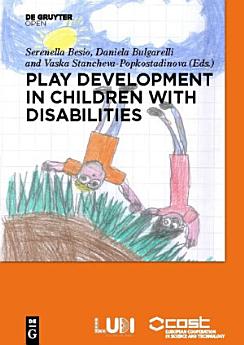Play development in children with disabilties
Serenella Besio · Daniela Bulgarelli · Vaska Stancheva-Popkostadinova
ଜାନୁଆରୀ 2016 · Walter de Gruyter GmbH & Co KG
3.9star
15ଟି ସମୀକ୍ଷାreport
ଇବୁକ୍
228
ପୃଷ୍ଠାଗୁଡ଼ିକ
reportରେଟିଂ ଓ ସମୀକ୍ଷାଗୁଡ଼ିକୁ ଯାଞ୍ଚ କରାଯାଇନାହିଁ ଅଧିକ ଜାଣନ୍ତୁ
ଏହି ଇବୁକ୍ ବିଷୟରେ
This book is the result of the first two-year work of Working Group 1 of the network “LUDI – Play for children with disabilities”. LUDI is an Action (2014-2018) financed by COST; it is a multidisciplinary network of more than 30 countries and almost 100 researchers and practitioners belonging to the humanistic and technological fields to study the topic of play for children with disabilities within the framework of the International Classification of Functioning Disability and Health (WHO, 2001).The principal objective of this book is to bring the LUDI contribution to the important topic of play in children with disabilities, because today an international consensus on the definition of play and disabilities is still lacking. The process of ensuring equity in the exercise of the right to play for children with disabilites requests three actions: to approach this topic through a “common language”, at least all over Europe; to put play at the centre of the multidisciplinary research and intervention regarding the children with disabilities; to grant this topic the status of a scientific and social theme of full visibility and recognized authority. Children with disabilities face several limitations in play, due to several reasons: impairments; playgrounds, toys and other play tools that are not accessible and usable; environments and contexts that are not accessible nor inclusive; lack of educational awareness and intentionality; lack of specific psycho-pedagogical and rehabilitative competence; lack of effective intervention methodologies. Moreover, disabled children’s lives are dominated by medical and rehabilitative practices in which play is always an activity aiming to reach an objective or to provoke an improvement; play for the sake of play is considered a waste of time. The concept of play for the sake of play strongly refers to the distinction between play activities and play-like activities. Play activities are initiated and carried out by the player (alone, with peers, with adults, etc.) for the only purpose of play itself (fun and joy, interest and challenge, love of race and competition, ilinx and dizziness, etc.). They have of course consequences on growth and development, but these consequences are not intentionally pursued. Play-like activities are initiated and conducted by an adult (with one or more children), in educational, clinical, social contexts; they are playful and pleasant, but their main objective is other than play: e.g., cognitive learning, social learning, functional rehabilitation, child's observation and assessment, psychological support, psychotherapy, etc. This book, then, contributes to a clear distinction between play and play-like activities that, hopefully, will bring to new developments in play studies.
ମୂଲ୍ୟାଙ୍କନ ଓ ସମୀକ୍ଷା
3.9
15ଟି ସମୀକ୍ଷା
ଲେଖକଙ୍କ ବିଷୟରେ
Serenella Besio, Aosta, Italy; Daniela Bulgarelli, Aosta, Italy; Vaska Stancheva-Popkostadinova, Blagoevgrad, Bulgaria
ଏହି ଇବୁକ୍କୁ ମୂଲ୍ୟାଙ୍କନ କରନ୍ତୁ
ଆପଣ କଣ ଭାବୁଛନ୍ତି ତାହା ଆମକୁ ଜଣାନ୍ତୁ।
ପଢ଼ିବା ପାଇଁ ତଥ୍ୟ
ସ୍ମାର୍ଟଫୋନ ଓ ଟାବଲେଟ
Google Play Books ଆପ୍କୁ, Android ଓ iPad/iPhone ପାଇଁ ଇନଷ୍ଟଲ୍ କରନ୍ତୁ। ଏହା ସ୍ଵଚାଳିତ ଭାବେ ଆପଣଙ୍କ ଆକାଉଣ୍ଟରେ ସିଙ୍କ ହୋଇଯିବ ଏବଂ ଆପଣ ଯେଉଁଠି ଥାଆନ୍ତୁ ନା କାହିଁକି ଆନଲାଇନ୍ କିମ୍ବା ଅଫଲାଇନ୍ରେ ପଢ଼ିବା ପାଇଁ ଅନୁମତି ଦେବ।
ଲାପଟପ ଓ କମ୍ପ୍ୟୁଟର
ନିଜର କମ୍ପ୍ୟୁଟର୍ରେ ଥିବା ୱେବ୍ ବ୍ରାଉଜର୍କୁ ବ୍ୟବହାର କରି Google Playରୁ କିଣିଥିବା ଅଡିଓବୁକ୍କୁ ଆପଣ ଶୁଣିପାରିବେ।
ଇ-ରିଡର୍ ଓ ଅନ୍ୟ ଡିଭାଇସ୍ଗୁଡ଼ିକ
Kobo eReaders ପରି e-ink ଡିଭାଇସଗୁଡ଼ିକରେ ପଢ଼ିବା ପାଇଁ, ଆପଣଙ୍କୁ ଏକ ଫାଇଲ ଡାଉନଲୋଡ କରି ଏହାକୁ ଆପଣଙ୍କ ଡିଭାଇସକୁ ଟ୍ରାନ୍ସଫର କରିବାକୁ ହେବ। ସମର୍ଥିତ eReadersକୁ ଫାଇଲଗୁଡ଼ିକ ଟ୍ରାନ୍ସଫର କରିବା ପାଇଁ ସହାୟତା କେନ୍ଦ୍ରରେ ଥିବା ସବିଶେଷ ନିର୍ଦ୍ଦେଶାବଳୀକୁ ଅନୁସରଣ କରନ୍ତୁ।




